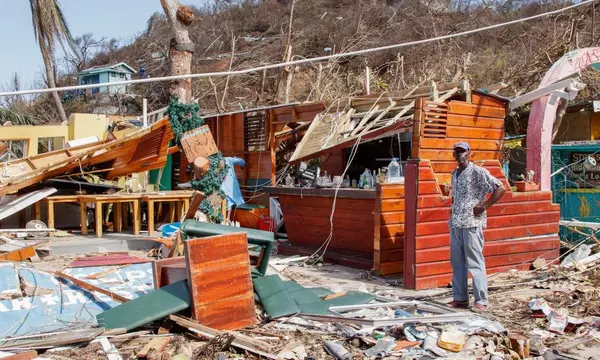Lawyers have said that the outcome of an international court case on climate change obligations could strengthen the legal position of Caribbean islands claiming damages from developed countries after natural disasters.
The case, brought to the international court of justice (ICJ) by the UN general assembly, seeks clarification on what states can be held liable for in relation to climate change. It has attracted the attention of numerous countries and organisations, with a record 91 written submissions lodged for consideration before a landmark oral hearing in The Hague this December.
The ICJ was only asked to provide an advisory opinion on the issue, but the human rights and global justice lawyer Nikki Reisch said that, while it will not single out specific emitters, the court’s opinion could and should strengthen the legal basis for holding countries accountable for their current and historical environmental damage.
“As an authoritative interpretation of states’ obligations under binding international law, the ICJ’s advisory opinion will undoubtedly influence the rising tide of climate litigation around the world,” Reisch said. “Any additional clarity the ICJ provides on the legal obligations of big polluters can only enhance the basis for progress in the climate negotiations, and strengthen the foundations for climate justice and accountability more broadly.”
Read also: Report: Industry acts to head off regulation on PFAS pollution from semiconductors
Caribbean leaders facing more frequent and furious storms, with hurricanes such as Maria, Irma, Dorian, and most recently Beryl causing almost total destruction to islands in the regions, say years of diplomacy are failing to bear fruit.
Ryan Pinder, the attorney general of the Bahamas, where Hurricane Dorian killed 20, damaged an estimated 13,000 homes and affected more than 76,000 people, said at least 40% of the country’s current debt could be attributed to rebuilding after climate change-related disasters. He added that it has become a fight for the lives and livelihoods of his population.
“We have tried diplomacy for many years as a region, as a country. We attend all of the United Nations meetings … we attend Cop [climate change conference]. We do all the diplomatic things that are expected of us. As we can see, that has gotten very little traction and the results are minimal. The temperature rise continues. The effects of severe storms in our region continue.
“We firmly believe that, in order to make a real impact or a real change, unfortunately, you have to do it where it hurts the most, and that is in the pocketbooks. And we think that pursuing climate justice matters in the courts and in a litigation space is an element of that,” Pinder said.
He added that while it is unlikely that the Bahamas would sue a liable developed country, the ICJ case can pave the way for cash injections into Caribbean economies through arrangements such as debt forgiveness. Pinder is also hoping the outcome of the case could help strengthen the argument for a global environmental tax on developed countries and force big emitters to pay into the UN climate change loss and damage fund for vulnerable countries.
The Bahamas is one of eight Caribbean countries that have appealed to the ICJ for an outcome that will strengthen the region’s legal position in climate loss and damage claims and negotiations.
Story was adapted from the Guardian.
